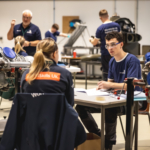In the context of Black Lives Matter, we have asked ourselves the question: are we doing enough to support young black people’s development and our black colleagues? And of course, the answer has to be no. Because we can clearly see their relative absence in our training programmes and our leadership. And our new data-driven approach to tracking diversity and inclusion in our work is helping shape our thinking on what specifically we can do next to remove barriers to progress.
In March this year, we published an ambitious report on diversity and inclusion in WorldSkills UK’s work, Championing difference for a better workforce. This diagnostic research was the culmination of a year-long deep dive analysis, involving 700 stakeholders, was wide-ranging in scope (covering gender, race, sexual orientation, disability and social mobility) and was ambitious in its recommendations. The results made for uncomfortable reading. And it firmly galvanised us as an organisation to focus and allocate resources to address the series of challenges with a more joined-up and data-driven approach. We developed a five-point plan, including improving access to our training opportunities, and we are tracking progress and using data insights to shape our thinking.
For example, the most recent data from our skills competition registrations, which was collated between March and May this year, show that young black people make up 2.7% of the total number of people who registered. The numbers also show young black people coming into our programme are mostly from London and the North West of England in particular, and from two colleges – Ealing, Hammersmith and West London College and LTE Group. We know that 13% of cohort are apprentices, with the rest in full-time education. We can also see that young black people are finding more attractive skills development in the digital, business and creative sector than other sectors. Black students are twice as likely to choose a digital skill over a construction skill in our programme. This data is helping us to take a more informed view on how to support these young people through our competitions programme this year to help them meet their full potential and how to increase our reach and impact to engage and support more black young people going forward.
And, of course, as an employer, we must practise what we preach. We conducted an extensive review of our internal diversity and inclusion policies and practices, while conducting research into the diversity of our young-people facing programmes. We have undertaken internal work on data and measurement so we can better understand our challenges. The results of our most recent staff diversity survey, conducted last month, says that over 90% of our staff believe we are an inclusive workplace and they feel they belong. This data shows the diversity of our workforce.
But of course, there are areas for improvement, particularly in the area of leadership and developing future leaders. Just over 10% of our workforce is black and we currently have no black colleagues in management or leadership positions. Our executive leadership team is currently white and male, although it contains LGBT, faith and social mobility diversity. Our non-executive board diversity currently comprises 20% women, 10% BAME and 10% LGBT. Our operational management team is gender balanced and contains diversity in relation to ethnicity, faith and social mobility.
So, it is clear we need to do much more. We will step up our ambition and we will continue to track progress and push for further change in our work with young black people, seeking new expert partners and resources to drive forward an agenda which helps create lasting change in our skills system. And as an employer, we will review our policies and practices on recruitment, retention and development, particularly for black colleagues, taking positive action where necessary.
We firmly believe that all this work is about raising the bar and widening the gate – because leveraging the benefits of higher standards in technical education for young black people, boosting meritocracy and achieving inclusion are not mutually exclusive. And our work as a skills organisation and as an employer go hand in hand: we need to be the change we want to see.


